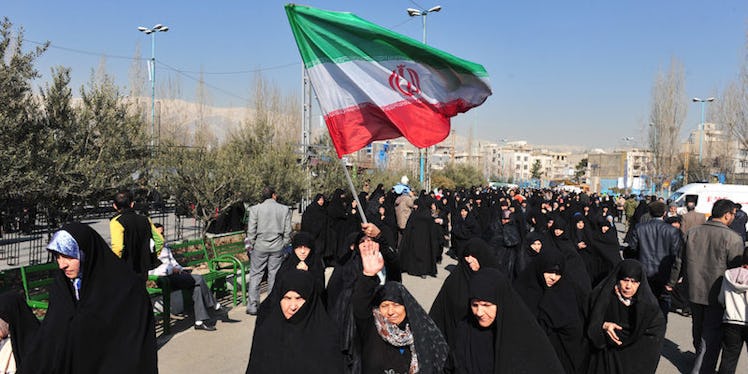
The Nuclear Deal In Context: Understanding Iran’s Dangerous Rise
The July 14, 2015 announcement of a nuclear agreement with Iran must be understood within the historical context of the region’s turbulence.
The Middle East has long held a monopoly on geopolitical crises. The region has experienced a disturbing continuity of corruption, economic stagnation and political illegitimacy at best.
At worst, countries have plunged into civil war, carried out genocide and may soon enter into a nuclear arms race.
An analysis of its internal power dynamics reveals a bitter contest for regional hegemony, an epic power struggle with Iran poised at the helm.
Consistently outmaneuvering its rivals and taking on greater responsibility in the fight against ISIS, Iran is forging strategic alliances and emerging as the dominant power in the Middle East.
America’s traditional allies like Saudi Arabia, not to mention Israel, have been left in the lurch; Obama appears resigned to Iranian supremacy.
More troubling is the realization that Obama may have accepted this geopolitical arrangement much earlier than the world originally thought. What’s worse, he may have designed it himself.
Iran’s sphere of influence has been steadily expanding, empowered in part by the inadequacy of rival regional powers.
Saudi Arabia, an oil-producing giant far wealthier than Iran, is often cited as the lone power remotely capable of countering Iran’s advance.
But Riyadh has struggled to offset the Shia regime’s seeping influence into vulnerable countries like Iraq and Syria and, more recently, Yemen, where Iran’s military apparatus has more than compensated for limited financial resources.
Seizing power in Yemen, Iranian-backed Houthis have marginalized Saudi influence.
Despite strong efforts to undo Houthi gains, Saudi Arabia has failed to meaningfully reverse the putsch, leaving an Iranian puppet on their doorstep.
With the unfreezing of billions of dollars in Iranian assets following Tuesday's deal, our friends in Saudi Arabia don’t stand a chance.
In the fight against Islamic State, Iran has similarly taken charge. Iraqi Prime Minister Haider al-Abadi recently described Iranian support in the campaign against ISIS as “essential.”
Shiite leadership in Iraq, coupled with Iran’s outpouring of aid and military mobilization, has shored up major support for Iran in its war-torn neighbor.
Iran’s reach stretches further to Syria through its backing of embattled President Bashar al-Assad and Lebanon, where the ruling Hezbollah terrorist enterprise enjoys Iranian funding, offering further evidence of this modern-day Iranian imperialism.
President Obama has only bolstered Iran’s credibility, facilitating Iranian ground successes against ISIS with US airstrikes.
In 2013, analysts were already calling for US intervention in Syria to stem the rising tide of Iranian influence.
But in December, Obama appeared confident in Iran’s potential for leadership and praised the nation’s “incredible talent and resources and sophistication.”
It seems Obama doesn’t mind Iran’s ascent.
In a 2011 book, geopolitical analyst George Friedman argued that Obama must now ally with “countries that had previously been regarded as strategic and moral threats.”
Friedman draws a parallel to World War II, comparing the US-Soviet alliance against a greater evil in Hitler to America’s current rapprochement with Iran in combating Middle Eastern discord.
He concludes the US must accept Iranian hegemony to achieve its greater strategic goals.
But, if we consider the Soviet Union, whose raison d’être was to spread the socialist revolution, its power-grab across Eastern Europe in the wake of Hitler’s retreat provides an alarming precedent.
Iran may very well be following in Soviet footsteps. Pushing back against Sunni extremist groups, often under the guise of exporting its Shiite revolution, Iran’s political agenda is reminiscent of the Cold War.
Khamenei will likely continue along this Stalinist track, extending his authority into countries desperate for aid and military support.
If that’s the case, his growing empire already has an impressive start in Baghdad, Damascus, Beirut and Sana’a.
Iran’s aggression should have isolated it from the United States: the historical champion of freedom and democracy.
Its endorsement and funding of terrorism, its antagonism toward America and its suppression of the democratic ethos should have triggered further sanctions.
After all, Iran came to the negotiating table weak and desperate for relief, struggling with a shameful economy and a frustrated people.
But Washington’s own behavior has eroded its legacy as the great “arsenal of democracy.”
Instead, Obama’s approach forces us to question his political calculations. Perhaps, the President’s realpolitik is too cynical for public consumption.
Indeed, it appears Obama has simply tired of the region and is prepared to renounce American responsibilities in the Middle East.
At its root, the issue is one of political philosophy, reconciled to the prospect of Iranian hegemony; Obama opts for political expedience over political principle.
In doing so, he has capitulated to a regime that violates human rights, calls for the destruction of Israel, sponsors terrorism and rejects international norms.
The alternative theory is Obama is neither passive nor isolationist. Rather, he is actively endorsing a complete reconfiguration of the Middle East.
If his actions are meant to curry favor with an ascendant radical Iranian regime whose patent anti-Americanism is rivaled only by its anti-Semitism, Obama’s gamble may backfire.
It is doubtful that a rogue regime with such designs for hegemony will abide by international law — or human decency — once armed with nuclear weapons, an unrestricted economy and a fast-growing territorial base.
All of which begs the question: Is the president deliberately serving the Middle East to Iran on a silver platter?
Barack Obama is an intelligent and savvy president. His decisions have been carefully considered and executed in service of this geopolitical assessment.
Obama has, in sum, recalibrated American foreign policy. For a region marred by unrelenting violence and deep unrest, a new diplomatic framework might be welcome.
But his peculiar vision has drawn criticism from Democrats and Republicans alike, and has endangered our international allies.
Perhaps, I have it wrong and Obama’s actions aren’t based on political convenience and are actually principled -- idealistic, even.
Either way, playing kingmaker in the Middle East does not bode well for Obama’s own throne.